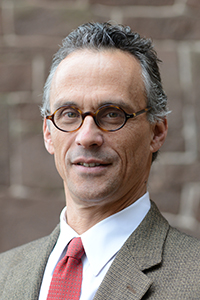President Roth: Jefferson Would Not Have Liked This College Trend

Writing in The Washington Post, President Michael S. Roth decries the push for students to turn away from “college as exploration” and toward “college as training.”
“Everywhere one looks, from government statistics on earnings after graduation to a bevy of rankings that purport to show how to monetize your choice of major, the message to students is to think of their undergraduate years as an economic investment that had better produce a substantial and quick return,” he writes.
This movement is understandable, given the “scourge of student indebtedness” in our country, yet parents, pundits and politicians are misguided in their insistence that students must study science, technology, engineering and mathematics (STEM fields), or else “miss the economic boat,” Roth writes.
As president of a university dedicated to broad, liberal education, I both deplore the new conformity and welcome an increased emphasis on STEM fields. I’ve been delighted to see mathematics and neuroscience among our fastest growing majors, have supported students from under-represented groups who are trying to thrive in STEM fields, and have started an initiative to integrate design and engineering into our liberal arts curriculum.
Choosing to study a STEM field should be a choice for creativity not conformity. There is nothing narrow about an authentic education in the sciences. Indeed, scientific research is a model for the American tradition of liberal education because of the creative nature of its inquiries, not just the truth-value of its results. As in other disciplines (like music and foreign languages), much basic learning is required, but science is not mere instrumental training; memorizing formulae isn’t thinking like a scientist. On our campus, some of the most innovative, exploratory work is being done by students studying human-machine interactions, using computer science to manipulate moving images to tell better stories, and exploring intersections of environmental science with economics and performance art.
At Wesleyan, Roth sees many students connecting seemingly disparate fields—math and art, biology and theater—in a type of exploration that “develop[s] habits of mind that allow them to develop connections that others haven’t seen”; these students “will be creating the opportunities of the future.”
He concludes:
When Thomas Jefferson was thinking through a new, American model of higher education, it was crucial for him that students not think they already knew at the beginning of their studies where they would end up when it was time for graduation. For him, and for all those who have followed in the path of liberal education in this country, education was exploration – and you would only make important discoveries if you were open to unexpected possibilities. About a century later W.E.B. Du Bois argued that a broad education was a form of empowerment not just apprenticeship. Both men understood that the sciences, along with the humanities, arts and social sciences had vast, integrative possibilities.
This integrative tradition of pragmatic American liberal education must be protected. We must not over-react to fears of being left behind. Yes, ours is a merciless economy characterized by deep economic inequality, but that inequality must not be accepted as a given; the skills of citizenship acquired through liberal learning can be used to push back against it. We must cultivate this tradition of learning not only because it is has served us well for so long, but because it can vitalize our economy, lead to an engaged citizenry and create a culture characterized by connectivity and creativity.

